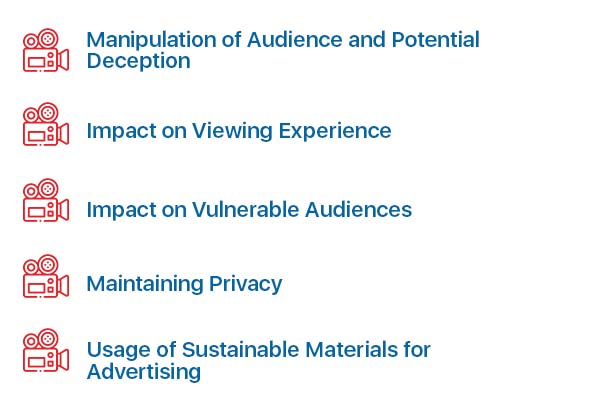- Offline Marketing
- 26 Apr, 2023
Cinema advertising has become a popular way for businesses to reach a large audience. It offers a unique opportunity to advertise to a captive audience who are already engaged in a leisure activity.
It is also known as movie theatre advertising and is a form of marketing that involves showing commercials or trailers on big screens in movie theatres before the main feature film starts. This type of advertising can be effective for reaching a captive audience of moviegoers, but it also raises a number of ethical considerations that must be carefully considered.
However, there are several ethical considerations that businesses should keep in mind when using cinema advertising as a marketing strategy.
Manipulation of Audience and potential Deception

One ethical consideration of cinema advertising is the potential for manipulation of the audience. Moviegoers may feel trapped in their seats and forced to watch commercials before the feature film begins, which can create a sense of pressure to pay attention to the advertisements. It is essential for advertisers to be transparent about their intentions and ensure that their ads are not misleading or deceptive. This includes disclosing any hidden fees or conditions associated with the advertised product or service.
- Impact on Viewing Experience
Some audiences may find the presence of advertising disruptive to their enjoyment of the film. Ads that are loud, intrusive, or overly frequent can create a sense of annoyance or frustration that may lead to negative feelings towards both the advertisement and the product being advertised. This can be particularly true in cases where ads are repeated several times throughout a single screening, causing the audience to feel bombarded with marketing messages.
- Impact on Vulnerable Audiences
Another ethical consideration of cinema advertising is the impact on vulnerable audiences. Children and young people are often frequent moviegoers, and may be particularly susceptible to the persuasive tactics of advertising. Ads that target these groups with messages that encourage unhealthy or inappropriate behaviours, such as junk food consumption or excessive screen time, can have negative impacts on their health and well-being.
- Maintaining Privacy
Privacy is also an ethical consideration when it comes to cinema advertising. Moviegoers may feel that their privacy is being invaded if they are subjected to targeted advertising based on their personal information. Advertisers should be transparent about their data collection practices and ensure that they comply with privacy regulations.
- Usage of Sustainable Materials for Advertising
The production and distribution of advertising materials can have a negative impact on the environment. Advertisers should strive to use sustainable materials and reduce their carbon footprint wherever possible.
Wrapping Up
In conclusion, cinema advertising raises a number of ethical considerations that must be carefully considered by marketers and advertisers.These considerations must all be weighed against the potential benefits of this form of marketing. Advertisers must be mindful of the potential negative impacts of their messages, and strive to create advertisements that are both effective and ethical. By doing so, they can create a more positive and productive relationship with their audience, and contribute to a healthier and more responsible marketing landscape.